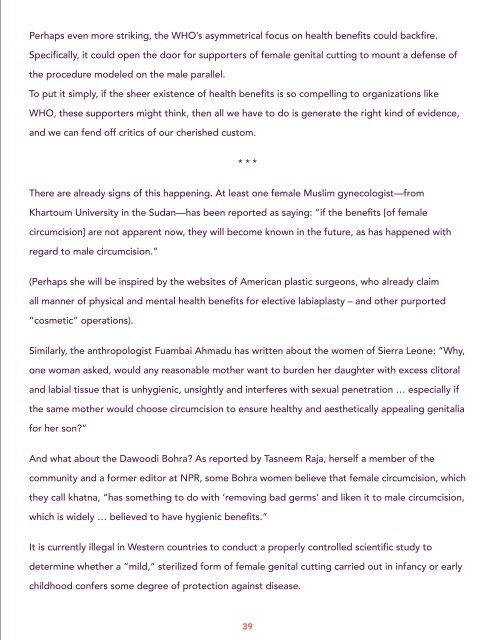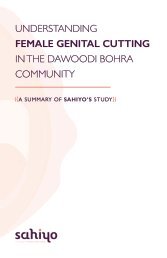Sahiyo Communication Guide
Create successful ePaper yourself
Turn your PDF publications into a flip-book with our unique Google optimized e-Paper software.
Perhaps even more striking, the WHO’s asymmetrical focus on health benefits could backfire.<br />
Specifically, it could open the door for supporters of female genital cutting to mount a defense of<br />
the procedure modeled on the male parallel.<br />
To put it simply, if the sheer existence of health benefits is so compelling to organizations like<br />
WHO, these supporters might think, then all we have to do is generate the right kind of evidence,<br />
and we can fend off critics of our cherished custom.<br />
* * *<br />
There are already signs of this happening. At least one female Muslim gynecologist—from<br />
Khartoum University in the Sudan—has been reported as saying: “if the benefits [of female<br />
circumcision] are not apparent now, they will become known in the future, as has happened with<br />
regard to male circumcision.”<br />
(Perhaps she will be inspired by the websites of American plastic surgeons, who already claim<br />
all manner of physical and mental health benefits for elective labiaplasty – and other purported<br />
“cosmetic” operations).<br />
Similarly, the anthropologist Fuambai Ahmadu has written about the women of Sierra Leone: “Why,<br />
one woman asked, would any reasonable mother want to burden her daughter with excess clitoral<br />
and labial tissue that is unhygienic, unsightly and interferes with sexual penetration … especially if<br />
the same mother would choose circumcision to ensure healthy and aesthetically appealing genitalia<br />
for her son?”<br />
And what about the Dawoodi Bohra? As reported by Tasneem Raja, herself a member of the<br />
community and a former editor at NPR, some Bohra women believe that female circumcision, which<br />
they call khatna, “has something to do with ‘removing bad germs’ and liken it to male circumcision,<br />
which is widely … believed to have hygienic benefits.”<br />
It is currently illegal in Western countries to conduct a properly controlled scientific study to<br />
determine whether a “mild,” sterilized form of female genital cutting carried out in infancy or early<br />
childhood confers some degree of protection against disease.<br />
39



